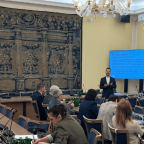About CEDMO
The Central European Digital Media Observatory (CEDMO), as an independent non-partisan multidisciplinary hub, aims to identify, research and prioritise the most critical sources and causes of information disorders in Central Europe (mainly the Czech Republic, Slovakia and Poland). This international consortium was created to propose a set of short and longer-term actions, as well as recommendations to help civil society, public institutions and the private sector respond to the declining trust in key institutions and help society to resist the effect of increasing exposure to mis- and disinformation.
By interacting and coordinating with European Digital Media Observatory (EDMO) and other regional EDMO hubs in EU, CEDMO will contribute to curbing threats posed by information disorders, including disenchantment with the democratic processes, and discord in civil society in Europe, and to building community and nation-wide resilience while protecting information ecosystems.
O CEDMO
The Central European Digital Media Observatory (CEDMO) jest niezależnym, bezpartyjnym i multidyscyplinarnym hubem, którego celem jest identyfikowanie, badanie oraz priorytetyzowanie najbardziej istotnych źródeł i powodów zaburzeń informacyjnych w Europie Środkowej (głównie w Czechach, W Słowacji i w Polsce).
Nasi Partnerzy
O CEDMO
The Central European Digital Media Observatory (CEDMO) jest niezależnym, bezpartyjnym i multidyscyplinarnym hubem, którego celem jest identyfikowanie, badanie oraz priorytetyzowanie najbardziej istotnych źródeł i powodów zaburzeń informacyjnych w Europie Środkowej (głównie w Czechach, W Słowacji i w Polsce).
Nasi Partnerzy
Internauci rozsyłają informację, jakoby prezydent USA Joe Biden przyznał publicznie, że potrzeba więcej pieniędzy, „aby zaplanować drugą pandemię”. To zmanipulowana wersja jego wypowiedzi z 2022 roku.
„Sąd na Filipinach wydał międzynarodowy nakaz aresztowania Billa Gatesa w ramach śledztwa w sprawie wprowadzenia szczepień przeciwko Covid-19 na tym terytorium” – czytamy w publikacji udostępnionej 4 marca na Facebooku, również tutaj i tutaj. Podobne treści były także udostępniane na Telegramie, zyskując 9,6 tys. wyświetleń oraz na Twitterze, gdzie miały 141 retweetów.
„Na niebiesko kraje, w których samochody spalinowe będą zabronione w 2035 roku, klimatyzm” – czytamy w publikacji udostępnionej na Telegramie.
„Oj tam teoria spiskowa” – czytamy w publikacji udostępnionej 6 kwietnia na Twitterze. „Chciałbym zobaczyć miny pelikanów, którzy pomagali w akcji przesiedleńczej Ukraińców do Polski i przyjmowali ich do domów” – dodaje autor tweeta odnosząc się do osób, które w ostatnich miesiącach przyjęły do swoich domów uchodźców z Ukrainy.
Ponad milion wyświetleń w sieci ma film pokazujący mocno uszkodzony okręt na środku oceanu, który powoli tonie. Wielu internautów wierzy, że ogląda tonący krążownik Moskwa – ale to jest kolejne stare wideo rozsyłane w sieci.
Prezydent Ukrainy rzekomo zapowiedział, że jego kraj po wojnie z Rosją stanie się miejscem osiedlania się Żydów – taki rozpowszechniany w polskiej sieci przekaz powstał na bazie zmanipulowanego tytułu artykułu jednego z serwisów.































